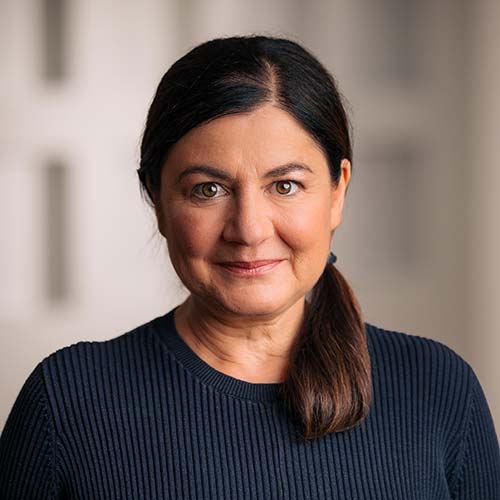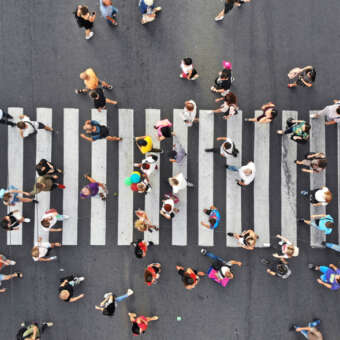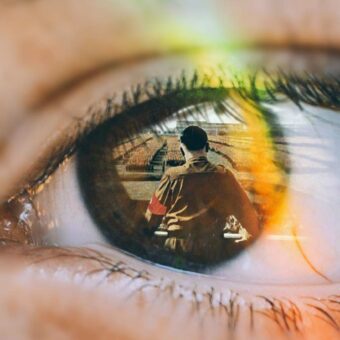Zwei Drittel der Bevölkerung misstrauen der Regierung und ihrer Politik – Zukunfts-Zuversicht scheint nur noch im Privaten möglich
Festgefahren zwischen Klimawandel und Krieg ist ein Großteil der Bevölkerung mit Blick auf Politik und Gesellschaft desillusioniert und reagiert auf die gespürte Aussichtslosigkeit mit einer Flucht ins private Glück. Das sind die zentralen Erkenntnisse einer tiefenpsychologischen Studie und einer repräsentativen Befragung, die das rheingold Institut im Auftrag der Identity Foundation, einer gemeinnützigen Stiftung für Philosophie aus Düsseldorf, durchgeführt hat.
Die Erkenntnisse der Studie kann man als dramatisch bezeichnen. Eine tiefe Resignation gegenüber der Politik und unseren Zukunftsmöglichkeiten, wie sie sich hier zeigt, bedroht unser nationales Zusammenleben. Wir sehen zu, wie ein ganzes Land vor der Wirklichkeit in Deckung geht, während sich die Verantwortlichen in der Berliner Politik in klein-klein verheddern.
Paul J. Kohtes, Vorsitzender der Identity Foundation.
Kaum noch Vertrauen in die Politik
Zwischen persönlicher Zuversicht der Deutschen und dem Vertrauen in Politik, Wirtschaft und Gesellschaft herrscht eine große Diskrepanz. Drei Viertel der 18-65-Jährigen (73 Prozent*) haben das Gefühl, »dass unsere Politiker keine Ahnung haben von dem, was sie tun«, 86 Prozent* sind der Meinung, dass die Politik übergreifende Lösungen für all die bestehenden Herausforderungen (wie Klimakrise, Inflation, gesellschaftliche Ungleichheit) entwickeln muss, weil diese Krisen nicht individuell von den Bürgerinnen und Bürgern bewältigt werden können.
Doch weil die Politik in ihren Augen dabei versagt, vertrauen nur 34 Prozent* der Regierung. Das ist zwar – noch – kein völliger Abgesang auf die Demokratie, denn 83 Prozent* stimmen zu: »Auch in diesen Zeiten politischer Herausforderungen bin ich überzeugt, dass unsere Demokratie nach wie vor die beste Lösung ist.« Doch die Kluft zwischen der wahrgenommenen Leistungsfähigkeit amtierender Politiker und dem, was die Bevölkerung als politisch notwendig erachtet, ist immens.
Das führt dazu, dass nur 23 Prozent beim Blick auf die Politik Zuversicht empfinden. Und 56 Prozent* der Befragten stimmen der Aussage zu: »Wenn ich die Entwicklung der Politik und gesellschaftlichen Stimmungen in Deutschland so betrachte, würde ich am liebsten auswandern.« Die große Mehrheit von 87 Prozent findet Zuversicht inzwischen vor allem im persönlichen Umfeld, in der Familie, bei Freunden und Bekannten.
Die Politik bietet keine übergreifende Perspektive, die die Gestaltungskraft der Bevölkerung aktiviert
73 Prozent der 18-65-Jährigen sind zuversichtlich in Feldern, in denen ihre Selbstwirksamkeit Früchte trägt, beispielsweise bei der Arbeit, im Studium oder in der Ausbildung. 60 Prozent* schöpfen Kraft daraus, aktiver Teil einer sozialen Gemeinschaft zu sein. Und 43 Prozent* werden im Ehrenamt oder in Vereinen tätig, engagieren sich politisch oder für Umweltbelange, um ihren Beitrag zum Gemeinwesen zu leisten. Eine Mehrheit von 73 Prozent* stimmt zu, dass sich vieles ändern muss und sagt, »dass der Einsatz von jedem Einzelnen entscheidend ist, um die gesellschaftlichen Herausforderungen zu stemmen«. Was zu fehlen scheint, um diese Bereitschaft zum Anpacken zu mobilisieren, ist eine übergreifende Perspektive der Politik, die Wege für ein gemeinsames Handeln aufzeigt.
Krisenverdrängung als Schutzschild
Bereits 59 Prozent* fühlen sich von den Krisenlagen der Gegenwart überfordert. Und 68 Prozent* ziehen sich mehr zurück und mögen es, ihre Ruhe zu haben. Nur 39 Prozent sagen von sich, dass sie sich noch ausführlich über das Weltgeschehen informieren, während 31 Prozent die Konzentration auf das eigene Leben als wichtiger empfinden als Politik und Nachrichten.
Die fünf Themen, die von den 18-65-Jährigen als besonders dringlich wahrgenommen werden, sind vor allem jene, die sich am unmittelbarsten auf das persönliche Leben auswirken: Inflation (51 Prozent), Altersarmut (46 Prozent), Klimawandel (43 Prozent), bezahlbarer Wohnraum (41 Prozent) und die Energiekrise (41 Prozent). Viele übergreifende politische Fragen und globale Bedrohungen werden der direkt erlebbaren, gegenwärtigen persönlichen Betroffenheit untergeordnet.
Insgesamt führen Krisenverdrängung und die Hinwendung zum Privaten dazu, dass eine Mehrheit für einen übergreifenden Wandel überhaupt nicht mehr ansprechbar ist. Nur 47 Prozent* sagen von sich: »Mein persönliches Engagement ist entscheidend, um die gesellschaftlichen Herausforderungen zu stemmen.« Die durchwachsene Gefühlslage der Deutschen lässt ihre Zukunfts-Zuversicht stark sinken. Zwischen großem privaten Optimismus (87 Prozent) und nahezu gleich ausgeprägtem politischen Pessimismus (77 Prozent), blicken lediglich 55 Prozent (eher) zuversichtlich in die Zukunft.
______________________________________
Zur Stichprobe und Methode der Studie:
Im Rahmen der qualitativen Zukunfts-Studie wurden jeweils 35 Proband*innen in zweistündigen psychologischen Tiefeninterviews befragt. Bei der Auswahl der Proband*innen wird darauf geachtet, dass politische Präferenzen und soziodemographische Strukturen (Geschlechter, regionale Verteilung, Altersverteilung, Bildung und Beruf) möglichst genau abgebildet werden. Die Tiefen-Explorationen wurden von einem fünfköpfigen Psycholog*innen-Team durchgeführt und analysiert. Untermauert wurden die Erkenntnisse durch eine quantitative Online-Befragung der 18-65-jährigen Bevölkerung (Bevölkerungsrepräsentative Stichprobe nach Alter, Geschlecht und Bundesland, n = 1.000).
* Top2-Wert (Summe der beiden Skalenpunkte „stimme voll und ganz zu“ und „stimme eher zu“) der 4er-Skala: „stimme voll und ganz zu“, „stimme eher zu“, „stimme eher nicht zu“, „stimme gar nicht zu“.
Vertiefende psychologische Erkenntnisse der Studie
Private Zuversicht hat einen gesellschaftlichen Preis
Der Rückzug etwa der Hälfte der Bevölkerung in private Welten geht einher mit einer resignativen Haltung in Bezug auf die eigenen gesellschaftlichen Einwirkungsmöglichkeiten. »Den Deutschen gelingt die Maximierung ihrer Zuversicht durch die Minimierung ihres Gesichtskreises«, kommentiert der Psychologe Stephan Grünewald, Studienleiter und Gründer des rheingold Instituts.
»Auf der Strecke bleiben durch diesen Umgang mit den Krisen gesellschaftliche Verantwortungsübernahme wie auch eine konstruktive Gesprächskultur.«
Stephan Grünewald, rheingold Institut
Die Verengung der persönlichen Sicht manifestiert sich vor allem in einer weitgehenden Verdrängung der globalen Krisen. Der Krieg in der Ukraine, der Klimawandel oder die Migrationskrise werden von den meisten Menschen in ihrem Alltag ausgeblendet. Für 57 Prozent der Deutschen gehört zum Beispiel die Klimakrise NICHT zu den fünf wichtigsten Krisen, 44 Prozent sind der Meinung, die Politik tut genug oder sogar zu viel für das Klima. Das wirkt wie ein Vorhang der Verdrängung, der das private Leben zusehends von der öffentlichen Sphäre trennt. Lediglich die für den persönlichen Alltag relevanten Themen wie Inflation, die Energiekrise oder die zunehmende Entzweiung der Gesellschaft kommen noch in die Wahrnehmung. Die Bereitschaft vieler Bürger sich über die Nachrichtenlage zu informieren, lässt nach.
So wird immerhin eine hohe private Zuversicht möglich, die allerdings von einem diffusen Grundgefühl der Bedrohung und Endzeitstimmung begleitet ist. Die Deutschen befinden sich psychologisch betrachtet nicht in einer (visionären) Zeitenwende, sondern in einer gedehnt wirkenden Nachspielzeit. Sie hoffen, dass die Verhältnisse, die sie kennen und schätzen, wenigstens noch eine gewisse Zeit fortbestehen. Eine aktivierende, von Ideen getragene Aufbruchsstimmung bleibt weitgehend aus. Der Fokus der Bürger wird auf die Stabilisierung der eigenen Lebenswelt gerichtet. Die drängendsten Ängste haben die Menschen daher vor einem persönlichen Autonomieverlust. Die am Beginn der Coronakrise und des Ukrainekrieges erlebten Ohnmachtsgefühle sollen sich nicht wiederholen. Die Angst vor dem sozialen Klimawandel und einer Spaltung der Gesellschaft ist bei vielen größer als die Angst vor dem ökologischen Klimawandel. 84 Prozent* machen die Erfahrung zunehmender Aggressivität in ihrem Umfeld.
Groß ist auch die Angst vor einem Systemverlust. Der einst so stolze Blick auf Deutschland weicht düsteren Zukunftsvisionen. Zwei Drittel fürchten, dass wir unseren Lebensstandard nach unten werden korrigieren müssen. Nur ein Drittel vertraut auf die Kraft, die wirtschaftlichen Verhältnisse im Lande wieder zu verbessern. Und weniger als jeder Fünfte kann sich vorstellen, dass sich das Gemeinschaftsgefühl in Deutschland und Europa künftig positiv entfalten wird.
Die Ängste der Deutschen im Detail:
- Die Angst vor einem Autonomie-Verlust ist die drängendste Angst. Sie zeigt sich in zunehmenden Ohnmachtsgefühlen und fehlenden Gefühlen der Selbstwirksamkeit. Zusätzlich geraten basale Bedürfnisse ins Wanken. Zum Beispiel stellen sich durch immer teurer werdenden Wohnraum in Städten und die Inflation neue Fragen: Wie kann ich meinen Lebensstandard halten und meine Miete bezahlen?
- Die Angst vor dem sozialen Klimawandel. Politische Radikalisierungen von rechts und links werden mit Sorge beobachtet. Der Wille zu Kompromissen fehlt, wodurch das Gefühl der Spaltung wächst. Von Gemeinschaftsgefühl und gegenseitiger Unterstützung wie in den Anfängen der Corona-Zeit ist kaum etwas geblieben.
- Die Angst vor Systemverlust macht sich an einem gefühlten Niedergang Deutschlands fest. Politiker streiten, die Wirtschaft strauchelt, Bildungsdefizite und eine marode Infrastruktur vervollständigen das desolate Bild.
- Die Angst vor dem globalen Klimawandel ist die Angst, die vielen Menschen bislang am wenigsten nahekommt. Die Klimakrise rückt erst in den Blick, wenn Dürre, Brände oder Überflutungen die eigene Welt bedrohen. Viele sehen sich insgeheim als Krisenprofiteure, weil beispielsweise der milde Winter dabei hilft, Heizkosten zu sparen. Und viele hegen zudem die Hoffnung, der vollen Wucht der Klimakrise doch noch entkommen zu können. Daher polarisiert das Thema Klima stark in der Bevölkerung. Für nur 43 Prozent der 18-65-Jährigen gehört die Klimakrise zu den fünf derzeit wichtigsten Krisen.
Die drei zentralen Quellen der Zuversicht
Die trotz der vielen Krisenerfahrungen überraschend hohe private Zuversicht, speist sich aus drei Umgangsformen:
- Räumliche und zeitliche Wohlfühl-Oasen schaffen
Das eigene Zuhause wird kontinuierlich verschönert oder man organisiert kleine Fluchten in den Urlaub oder in die Natur. 93 Prozent* geben an, dass sie es sich daheim so schön wie möglich machen, um sich einen sicheren Rückzugsort zu schaffen. 87 Prozent* gehen gerne in die Natur und finden dort ihre Ruhe. Und 76 Prozent* gelingt es, im Urlaub ihre Sorgen zu vergessen und sich mit Zuversicht aufzuladen. Die Fähigkeit, es sich im Privaten behaglich zu machen, ist abhängig von individuellen Wohlstandsressourcen, wobei nur jeder Vierte glaubt, dass sich die eigene wirtschaftliche Situation verbessern wird. - Soziale Bollwerke
Seit der Corona-Pandemie rücken kleine, aber enge soziale Kreise aus Gleichgesinnten immer stärker in den Fokus. Für 84 Prozent* hat das soziale Miteinander mit Freunden und Familie an Bedeutung gewonnen. Und 60 Prozent* schöpfen Kraft und Freude daraus, Teil einer sozialen Gemeinschaft zu sein. Die kleinen Gruppen, die sich über die Krisen hinweg als stabile Bezugspunkte erwiesen haben, werden gut gepflegt. Allerdings werden die Gemeinschaften immer hermetischer und grenzen sich von Andersdenkenden ab. Menschen, die anstrengend sind, weil sie eine andere Meinung oder Haltung vertreten, werden oft aussortiert.
- Selbstmodellierung
In einer komplexen und krisenhaften Welt wird für viele das eigene Ich zum Drehpunkt für Selbstwirksamkeit und Zuversicht spendende Erfolgserlebnisse. Die Selbstmodellierung kann körperlich über Sport, Fitness oder Schönheitspflege erfolgen. Seelisch stärken sich viele über Yoga, Achtsamkeit oder Meditation. Für 79 Prozent* ist es wesentlich, bewusst für Entspannung zu sorgen, um »die Herausforderungen des Lebens besser ertragen zu können«. Auch die eigene Intuition und Lebenserfahrung wird für viele zum Wegweiser durch den Alltag. Das ständige Kreisen um sich selbst birgt jedoch die Gefahr, in der Selbstbezüglichkeit stecken zu bleiben.
Drei Transformations-Hemmnisse sorgen für eine passiv-resignative Haltung
Die Zuversicht und die Kraft, die die Menschen in ihren Wohlfühloasen, in den sozialen Rückzugsbereichen und in der Selbstbezüglichkeit entwickeln, werden jedoch nicht nach außen transformiert. Der Blick auf die Welt da draußen ist von einer eher passiv-resignativen Haltung geprägt, die vor allem durch drei Umgangsformen bestimmt wird, die man als Transformations-Hemmnisse bezeichnen kann:
- Erlösungs-Hoffnung
Die Erlösungshoffnung geht mit dem Wunsch einher, das bisherige Leben ohne großen Verzicht und Umstellungen weiterführen zu können. Die größte Hoffnung liegt dabei im Fortschrittsglauben: Künstliche Intelligenz, die Medizin und neue Technologien sollen die großen Probleme der Zeit lösen. Vertraut und gehofft wird auch auf die menschliche Vernunft oder auf die junge Generation, an die man die Zukunftsaufgaben delegiert. Eine Variante des Gottvertrauens findet sich auch darin, dass 63 Prozent* der Menschen sich damit trösten, dass »alles was wir tun, am Ende einen Sinn hat«.
Eine zweite Erlösungs-Form ist der Glaube an eine rettende Instanz, die dafür sorgt, auserkorene Sündenböcke zu stigmatisieren und auf diese Weise Negatives abzuwenden. Diese Form geht mitunter mit einem empörten Aktivismus und der Bildung von Verschwörungserzählungen einher.
- Ablasshandel
Der Ablasshandel stützt die eigene Passivität durch kleinere Opferleistungen. Die basalste Form ist die bürgerliche Pflichterfüllung: Man tut seine Arbeit, zahlt brav seine Steuern und hat damit seine Zukunftsschuldigkeit getan. Eine zweite Form zollt der krisenhaften Welt im Außen Tribut durch kleine Verhaltensanpassungen – etwa durch den Verzicht auf Fleisch, den Umstieg aufs Fahrrad oder eine Reduktion des Fliegens. Eine dritte, jedoch eher seltene Form ist der aktive politische Einsatz für eine bessere globale Zukunft, die mit größeren persönlichen Opfern oder Einschränkungen einhergeht.
- Ästhetisiertes Ab- und Eintauchen
Das Eintauchen in Musik oder die Auseinandersetzung mit Kunst eröffnen neue Perspektiven und gesellschaftliche Begegnungsräume. Der Kinoabend, der Besuch einer Ausstellung oder eines Theaterstücks kann den Blick weiten für die Welt da draußen. Die Ästhetik kann daher ein inspirierender Wirkungsraum für die Entstehung neuer Ideen, (Zuver-)Sichten oder gesellschaftlicher Visionen sein, die über den Horizont des persönlichen Lebenskreises hinausweisen.
Allerdings berichten die Befragten, dass sie, vor allem seit der Coronazeit, zunehmend das kreative Eintauchen durch das selbstbezügliche Abtauchen ersetzen. Vor allem Serien auf Netflix oder soziale Medien wie Tiktok haben betäubenden, tröstenden Charakter. Man begibt sich in mediale Welten, die eher der Selbstbespiegelung dienen als den Perspektivwechsel zu fördern. Zudem entwickeln vor allem Medien wie Netflix eine fiktionale Hermetik, da man nicht mehr mit Nachrichten oder Dokumentationen konfrontiert wird, die den Blick auf die Welt draußen richten. Sie stabilisieren dadurch auf unterhaltsame Art und Weise die Realitätsverdrängung und die Minimierung des Gesichtskreises.
Hinweis für die Medien:
Paul J. Kohtes (Identity Foundation) und Stephan Grünewald (rheingold Institut) stehen für vertiefende Interviews zur Studie zur Verfügung.
Ausführliche, bebilderte Dokumentation der Studienergebnisse zum Download:
https://identity-foundation.de/studien/
https://identity-foundation.de/studien/deutschland-auf-der-flucht-vor-der-wirklichkeit/





